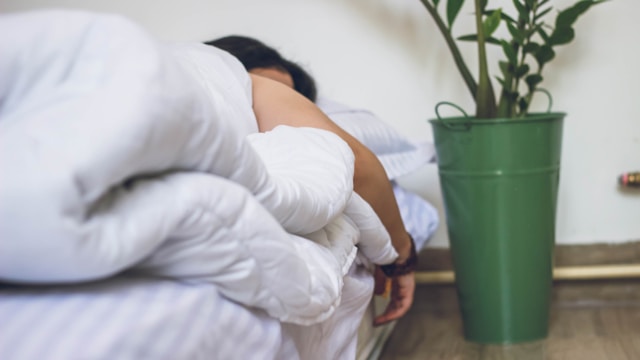报告称居民日平均睡眠不足7小时 “00后”入睡困难
中国日报网 2024-03-21 16:59

你每天几点能够入睡?如果回答是23:00之前,那么恭喜你,你可能已经击败了大多数人。如果你从未遭遇过失眠困扰,那你就是“人中龙凤”。日前公布的《2024中国居民睡眠健康白皮书》显示,居民整体睡眠质量欠佳,“00后”入睡困难……

Chinese residents sleep less than 7 hours per night, according to the 2024 Chinese National Healthy Sleep White Paper, released on Saturday by the Chinese Sleep Research Society.
中国睡眠研究会16日发布的《2024中国国民健康睡眠白皮书》显示,中国居民每晚睡眠时间不足7小时。
The report said that Chinese residents go to bed on average after 00:00 am, with an average sleep duration of 6.75 hours per night.
报告称,居民平均在零点后入睡,夜间睡眠平均时长为6.75小时。
The report was based on a survey of over 10,000 people, including students, office workers and retired employees.
该报告基于对10000多人的调查,其中包括学生、上班族和退休人员。
The report showed that 28 percent of respondents sleep less than 6 hours and 64 percent have poor sleep quality.
报告显示,28%的人群夜间睡眠时长不超过6小时,64%的人睡眠质量欠佳。
Most people have experienced sleep disturbances such as nocturnal awakenings, early awakenings, having trouble falling asleep and nocturnal urination, the report said.
大多数人都曾有过睡眠困扰,主要的睡眠困扰有:夜醒、早醒、入睡困难、夜间如厕。
The report also found that 59 percent of respondents suffer from insomnia while only 19 percent have no sleep disorders.
报告还发现,59%的人存在失眠症状,完全无睡眠障碍人群仅占19%。
Only 29 percent of respondents go to bed before 23:00 pm while 47 percent go to bed after 00:00 am and 13 percent do so after 2:00 am. Among them, the post-00s generation has an average bedtime of 00:33 am while the pre-1970s has an average bedtime of 23:02 pm.
仅有29%的被调查人群在23:00前入睡,47%的人群在零点后入睡,13%的人群在凌晨2:00后入睡。这其中,“00后”平均入睡时间为00:33,“70前”入睡时间为23:02。
Pre- and post-1970s retired people often suffer from nocturnal awakening, early awakening and nocturnal urination while the post-00s and post-90s generations have trouble falling asleep.
“70前”及“70后”的已退休人员常被夜醒、早醒、夜间如厕困扰,“00后”和“90后”的年轻人则困扰于入睡困难。
In terms of university students, 56 percent use their smartphones for more than 8 hours every day. 51 percent go to bed after 00:00 am and 19 percent do so after 2:00 am.
针对大学生群体,调查显示,56%的大学生每天使用手机超过8小时,且有51%的人在零点后入睡,更有19%的人入睡超过凌晨2:00。
The sleep duration of office workers on non-working days is 33 minutes longer than that of working days.
上班族群体在非工作日夜间睡眠比工作日平均多33分钟。
The report also showed a correlation between a person's lifestyle and the quality of their sleep.
本次发布的报告还揭示了睡眠与生活方式之间的关系。
People who exercise regularly (monthly exercise frequency ≥ 10 times) tend to go to bed and wake up early, with an average bedtime of 23:56 pm and wake-up time of 7:26 am. Compared with those with monthly exercise frequency ≤ 3 times, their sleep duration is nearly 14 minutes shorter.
数据显示,热爱运动的人群(月运动频次≥10次)偏向于早睡早起,平均23:56入睡,7:26起床,与月运动频次≤3次的人相比,他们的睡眠时间短了近14分钟。
In addition, the sleep duration of people who drink is 27 minutes shorter than that of non-drinkers. As the frequency of alcohol consumption increases, the sleep quality declines.
饮酒人群比不饮酒人群平均每晚少睡27分钟。饮酒频次越高,睡眠质量越低。
来源:中国日报网
编辑:董静
审核:万月英 陈丹妮

















 英语点津微信
英语点津微信 双语小程序
双语小程序